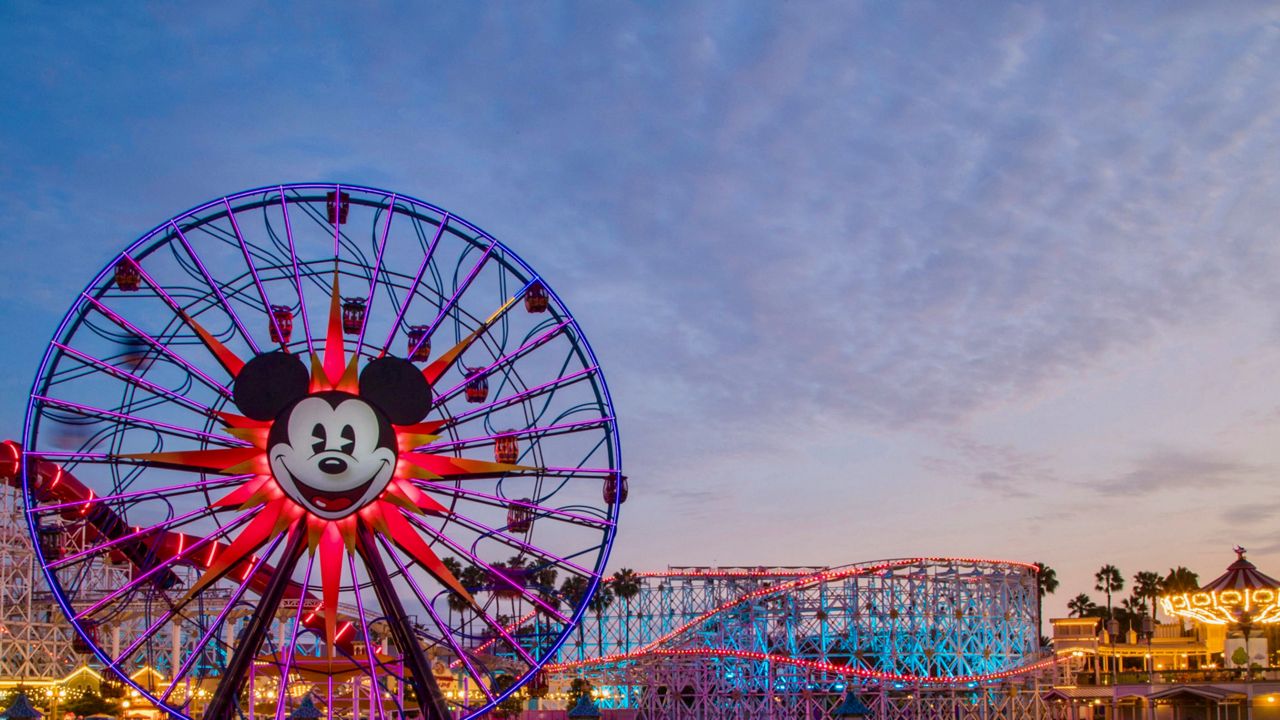ANAHEIM, Calif. — A new proposed legislation is advocating for all theme parks in the state to reopen at the same time.
Currently, large theme parks such as Disneyland, Knott's Berry Farm, and Universal Studios Hollywood can't reopen until its home county reaches the yellow tier, the least restrictive tier level that monitors coronavirus cases in the state's Blueprint for a Safer Economy plan. Smaller theme parks can reopen when their home county hits the orange tier – or second least restrictive tier.
The bill, authored by Assemblywomen Sharon Quirk-Silva and Martinez Valladares, would allow for the reopening of Disneyland and all theme parks across the state, regardless of size, when Orange County reaches the orange tier. Disneyland, Knott's Berry Farm, Legoland, and Universal Studios Hollywood remain closed.
"Now, more than ever, we need to strengthen our resolve to care for each other and to create clear and proper tiers to ensure the safety and health of our community and businesses," Quirk-Silva said in a news release. Quirk-Silva also serves as the state's chair of the Assembly Committee of Arts, Entertainment, Sports, Tourism, and Internet Media. "Through collaboration with industry leaders, responsible and safe tourism can be used as a pathway to recovery."
The proposed legislation comes 11 months after the coronavirus pandemic began and shuttered theme parks across the state. The closure of theme parks such as Disneyland has had a negative ripple effect on the local economy.
In Disneyland's case, tens of thousands of employees were laid off and furloughed. Many businesses closed from retail stores to hotels adjacent to the Disneyland Resort due to the lack of tourism in the area and foot traffic. Anaheim's general fund revenue sank since the city relies heavily on sales and bed taxes from the tens of millions of visitors that Disneyland annually attracts.
Overall, amusement parks in the state generate more than $12.6 billion in direct and indirect revenue impact and pay $1.5 billion annually in federal, state, and local taxes, according to Quirk-Silva.
Since the pandemic began, theme park operators through most of the year had called on Gov. Gavin Newsom to reopen theme parks, but each time was rebuffed. Newsom and health officials feared people visiting Disneyland or other theme parks could further spread the coronavirus and escalate the state's rising number of COVID-19 cases and deaths.
In October, Newsom and his health staff made definitive guidance for reopening amusement parks using the state's Blueprint for a Safer Economy model. The model uses a four-tier color system (purple, red, orange, and yellow) that tracks a county's coronavirus risk level and what restrictions, if any, certain businesses face.
According to the state, counties must remain in every tier for at least 21 days before becoming eligible to move into the next tier. A county must meet that tier's criteria for two straight weeks to move into a less restrictive tier.
Under the state's guidance, large theme parks with more than a 15,000 visitor capacity can reopen and only at 25% capacity when its home county's coronavirus risk level reaches the yellow tier. Theme park operators must also follow other guidance.
Smaller theme parks can reopen and at 25% capacity when their home county is in the orange tier – the second least restrictive tier.
Currently, Orange County, the home county of Disneyland and Knott's Berry Farm, is in the state's purple tier, meaning there is still a widespread risk of spreading the coronavirus.
Under Quirk-Silva's Assembly Bill 420, all theme parks, regardless of size, would be able to reopen under the orange tier. The change would save theme park operators from waiting until their home county reaches a less restrictive tier.
"Amusement parks can provide a safer environment for families and individuals to spend leisure time than many other places that are operating without the same degree of crowd control, physical distancing, and safety protocols," the bill reads. "California's amusement parks have historically made guest and employee health, safety, and satisfaction top priorities."
Disney and Knott's Berry Farm officials did not return a request for comment as of press time.
Legoland President Kurt Stocks said he applauds the legislators' efforts to reopen theme parks. Legoland, Stocks said, has been developing a plan to reopen safely.
"The extended closure of our resort has not only affected many of our staff who have either been on furlough or lost their jobs, but we are an integral part of San Diego's economy," Stocks said in a statement to Spectrum News 1. "We have gained praise from state, county and city legislators whom we have met with and walked through our plan. There is no scientific proof or data linking any COVID outbreaks to any theme park globally."
Visit Anaheim President and CEO Jay Burress said he welcomes the new proposed legislation.
"Our organization firmly supports efforts to advance the reopening of our landmark attraction and economic engine, Disneyland, into the orange tier," Burress said. "By bringing the reopening of our theme parks a step closer, it will give our residents and workers hope for recovery and make it possible for local hotels, restaurants, and other tourism businesses to rehire their workforce sooner rather than later."



